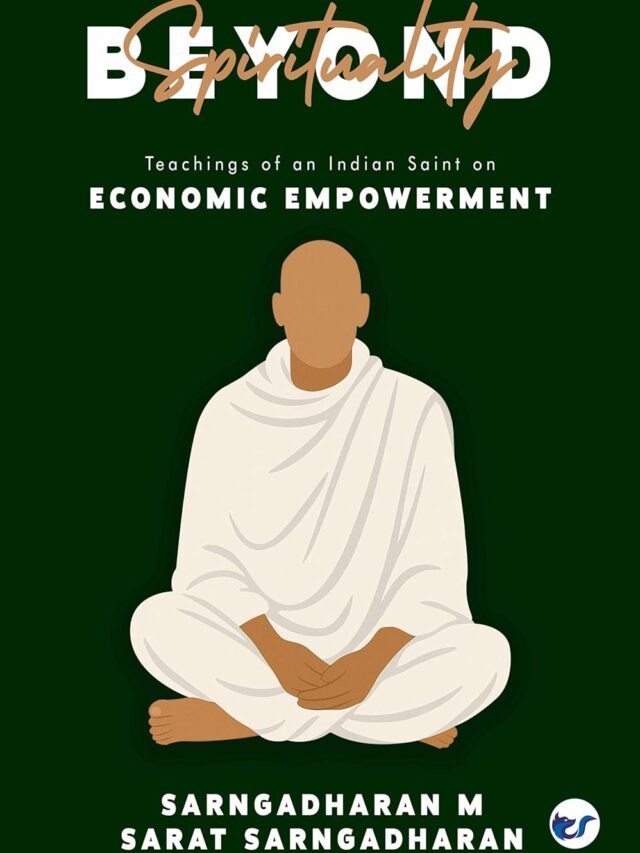
Beyond Spirituality: Teachings of an Indian Saint on Economic Empowerment: In the vast panorama of India’s social and philosophical evolution, Sree Narayana Guru (1856–1928) occupies an irreplaceable position. While his legacy is often celebrated for its spiritual, ethical, and social dimensions, Sarat Sarngadharan’s compelling new book, Beyond Spirituality: Teachings of an Indian Saint on Economic Empowerment, introduces readers to an underappreciated aspect of the Guru’s vision—his incisive understanding of economics as a pathway to true societal transformation.
This book is a timely and important contribution, especially in an era where the intersection of spirituality and development is being revisited in both policy and academic circles. Sarngadharan moves beyond the traditional hagiography associated with saintly figures and instead presents a deeply researched, thought-provoking study of Sree Narayana Guru’s economic philosophy, rooted in the realities of colonial and postcolonial India.
A Visionary Beyond His Time
What makes this work particularly engaging is its ability to weave together historical insight with contemporary relevance. Guru, who lived during a time of rigid caste structures, social inequalities, and economic stagnation, recognized that real liberation required more than just spiritual awakening—it demanded material empowerment. As the book outlines, Guru saw education, organization, and industry not merely as tools for progress but as instruments of social justice.
Sarngadharan brings out Guru’s progressive ideas on education with clarity. For Guru, education was the bedrock of self-reliance. He did not see it as a privilege for the elite but as a fundamental right for every individual—especially the oppressed and marginalized. The book highlights Guru’s belief that only through learning and critical thinking could individuals rise above inherited limitations and participate meaningfully in the nation’s growth.
From Cooperation to Co-operatives
One of the most compelling sections of the book examines Guru’s emphasis on organizational models and cooperative economics. Long before the term “MSME” (Micro, Small, and Medium Enterprises) gained currency in policy debates, Guru advocated for small-scale industries and cooperative models that empowered local communities. Sarngadharan draws upon Guru’s writings and speeches to argue that these ideas were far ahead of their time, predating many modern development theories that stress inclusive growth.
Guru’s idea of cooperative living extended beyond economic transactions. He believed that ethical cooperation in production, trade, and social responsibilities was essential to creating a harmonious and self-sustaining society. This echoes many of the principles later found in Gandhian economics, but with a distinct practicality and emphasis on individual initiative.
A Grounded Approach to Empowerment
Rather than relying solely on abstract philosophy, Guru’s teachings encouraged action. Sarngadharan’s narrative illustrates how the saint urged his followers to not just meditate and pray, but to “organize, educate, and progress”—a mantra that remains relevant today. In a nation still grappling with economic inequality, unemployment, and rural distress, Guru’s call to engage minds in productive work and entrepreneurship seems prophetic.
The book’s strength lies in its rootedness. Drawing from the author’s earlier Malayalam work Economic Vision of Sree Narayana Guru, this English version is not a mere translation but a refined presentation, intended for a wider audience that includes scholars, policymakers, educators, and socially conscious readers. Sarngadharan’s lucid prose and well-organized structure make complex ideas accessible without sacrificing intellectual depth.
Contemporary Relevance
In today’s India, as debates continue around economic reforms, skill development, social justice, and spiritual values, Beyond Spirituality offers a refreshing reminder that these domains are not mutually exclusive. Guru’s teachings challenge us to think differently—to see economic empowerment not as a separate agenda, but as an essential expression of human dignity.
The book also implicitly critiques modern development models that are too often disconnected from ethical and social frameworks. Guru’s holistic approach—emphasizing moral clarity, community responsibility, and economic independence—may very well be the blueprint the modern world is searching for.
Final Thoughts
Sarat Sarngadharan’s Beyond Spirituality is more than a book—it is a rediscovery. It brings to light the practical wisdom of one of India’s greatest reformers and shows us how ancient insights can illuminate contemporary challenges. In placing Guru’s economic thought alongside his spiritual philosophy, this work bridges the material and metaphysical in a way that few books have attempted.
For anyone interested in the intersections of spirituality, development, and social reform, this book is essential reading. It not only pays tribute to Sree Narayana Guru’s enduring legacy but also invites us to imagine a future where economics is not just about profit—but about progress with purpose.
















